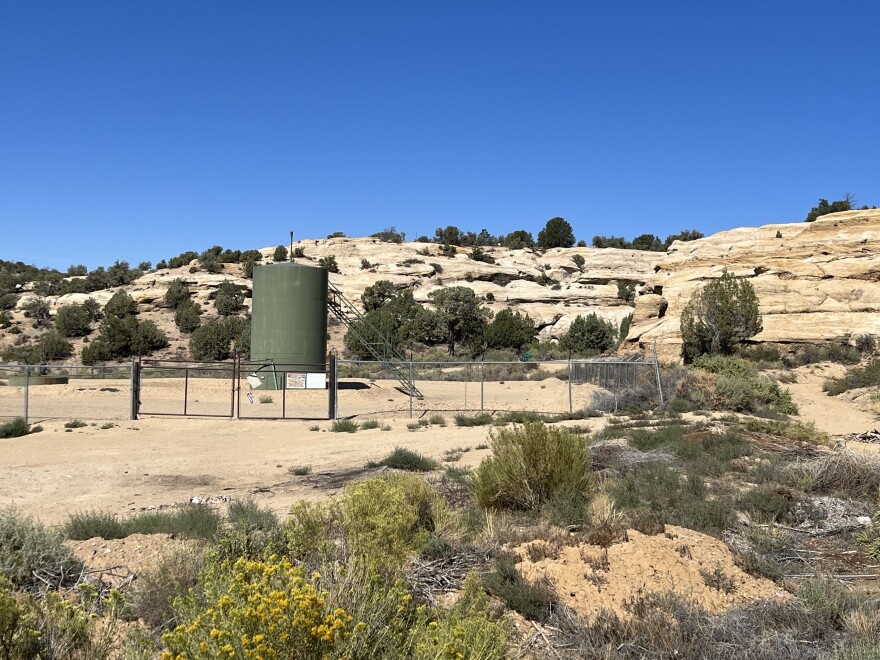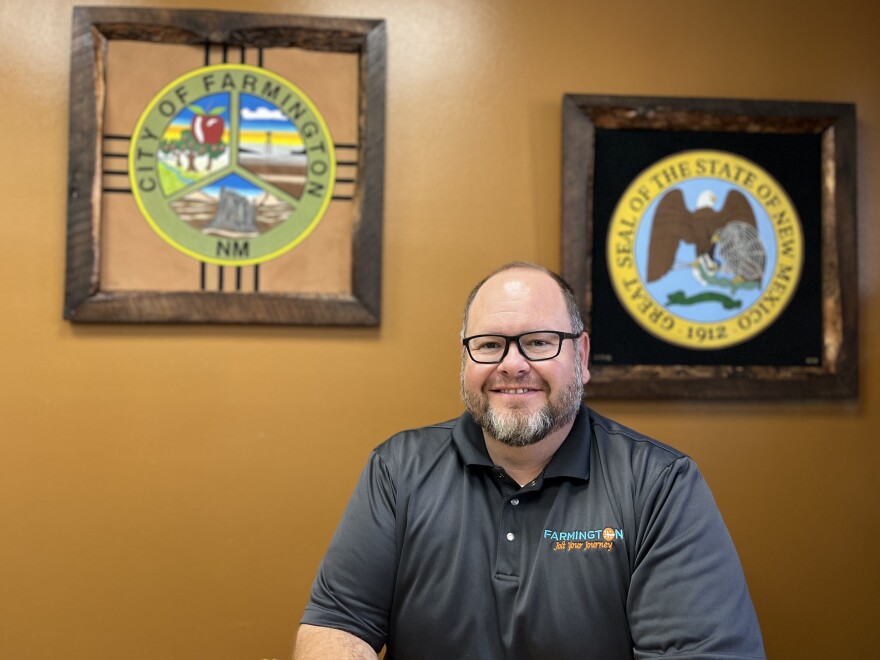FARMINGTON, N.M. — It's late afternoon in Farmington, and the sun is casting an orange glow on sandstone cliffs where new mountain bike trails have been carved into the powdery dirt beneath.
A group of middle school girls are learning trail etiquette and practicing climbing hairpin turns.
"Alright girls, we'll climb up," instructs Amy Conley, a coach with the local non profit Farmington Area Single Track, or FAST.
Demand for the after school program has grown exponentially since it began in 2020. Conley, who grew up in Farmington, is thrilled to see all the newfound use of public lands that surround her hometown.
"My whole family has worked [in the] oil field, and now it's changing," Conley says. "There's not as much as there used to be, so it's a lot different."
The oil and gas fields built Farmington. For decades, natural gas and coal from the surrounding San Juan Basin helped power California. Lately, demand has slumped, and the the boom-and-bust cycles have pushed towns such as Farmington to diversify.
The town is caught up in a bigger national transition
Farmington, population 45,000, is now working overtime promoting its outdoor amenities and easy access to U.S. public lands.
"I mean, we need something to keep people wanting to come this way. There's tons of potential," Conley says.

Some in the West see sweeping new federal land use rules passed in President Biden's Inflation Reduction Act as key to economic revitalization for rural regions like northwest New Mexico that relied on oil and gas for decades but are now trying hard to diversify into tourism, recreation and green manufacturing.
This fall, the federal Bureau of Land Management is finalizing the new on-shore oil and gas leasing rule contained in the act. It could dramatically change how and where federal land becomes available for new leases to companies that want to drill across the West. Since the Mineral Leasing Act was passed in 1920, there have been few changes to the federal royalty rates that drillers pay, or to the bonds they must post before drilling to cover cleanup after.
"This is a long-overdue update of our oil and gas rules that will make a huge difference on the ground for the future of so many communities," says Ashley Korenblat of Public Land Solutions, a Moab, Utah-based nonprofit that consults with communities looking to transition to outdoor recreation economies.
The new rule would increase royalty rates on federal land from 12.5% to 16.67% and increase bonds from the current $10,000 to $150,000, among other significant changes.
"People like to blame it on regulation, but the reality is the market is changing for these communities," Korenblat says. "If the regulations don't keep up with actual market needs, you create this strange place where the communities are not winning from either recreation or oil and gas."
Few outdoor recreation staffers cover an enormous area
Korenblat says the reforms could help Western towns that are trying to market their access to the great outdoors and diversify away from fossil fuel dependence.
Around town, there's a growing frustration these days that the local Bureau of Land Management field office — which controls most of the land around Farmington — has only two full-time staff working on outdoor recreation. There's also only one BLM ranger patrolling this vast region the size of Connecticut.
Mountain biker and FAST co-founder Chris Conley wants to keep expanding his group and use more trails including a recently built bike park on federal land. But he says they continually run into delays, bureaucratic red tape and rising fees.
"We're doing everything we can in our power to try and get kids outside," Conley says. "But we're met with opposition sometimes. We're just doing what we can and trying to navigate it."
The Bureau of Land Management declined interview requests for this story.
Those who still work in the oil and gas industry around the San Juan Basin say they haven't been getting much support from the agency in recent years, either.
"It's just such a slog to get through the BLM already," sighs George Sharpe, an investment manager with Merrion Oil and Gas in Farmington. "And all they're doing is making it harder."
Industry says new rule is political not practical
Merrion's headquarters sit across from Farmington's modern City Hall on a hill overlooking town and the Animas River, which is running cappuccino-colored after big thunderstorms rolled through.
Its prominent address feels symbolic. After all, oil and gas put Farmington on the map after early mom-and-pop companies like Merrion began exploring in the San Juan Basin in 1960. A large photo of the company's Edna Well — which is still producing -- sits in a hallway off of Sharpe's office.

Much of the San Juan Basin has already been leased for drilling. But the industry says there's still upwards of 100 trillion cubic feet of untapped natural gas, an estimate that doubles all the natural gas that's already been mined here.
Sharpe thinks the timing of the BLM's proposed rule is ironic — New Mexico is currently second only to Texas in oil production, and is raking in record revenue.
"I believe climate change is happening. I believe man's making an impact. I think we need to do something about it," Sharpe says. "I just think if you're trying to get off oil and gas, if you stop the production before you stop the consumption, that's a recipe for disaster."
A town caught in the middle of new goals and old rules
The controversy over the new onshore leasing rule follows a rocky couple of years for the Biden administration that may demonstrate how hard it is to fulfill a campaign promise to wean the country off fossil fuels.
Shortly after President Biden took office in 2021, he froze all new leasing for drilling on federal land. Lawsuits quickly forced the government to resume quarterly lease sales on federal land.
Republicans have blasted the new rule as the latest in a so-called war on energy independence. Most GOP presidential candidates at a debate Thursday vowed to overturn them.
It's a view shared by some around Farmington, where the new rule is seen as a half-hearted attempt at compromise.
Mayor Nate Duckett said the administration is "tightening the noose" all the time when it comes to drilling on federal land.
"If they stopped all production on federal lands, it would be awful for our area," Duckett says.
The mayor has been trying to boost Farmington's outdoor recreation economy by luring more outdoor retailers and manufacturers of outdoor goods, such as fly rods, bullets for hunting or river rafts. He says newly erected signs around town pointing locals and visitors to all the outdoor amenities have helped spur an economic boon.

But Duckett also worries that the new drilling rule would be a further setback to an industry that funds so many local charities and other services. He points out the salary for outdoor jobs, such as a rafting or fishing guide, will never replace the well-paying jobs in traditional fossil fuel industries.
"Oil and gas and coal have been paying for everybody for a long time," he says. When Duckett was a teenager, his stepfather relocated his family from Denver to New Mexico for a job in the coal mines.
On outdoor recreation, Duckett says, "This is really an accompaniment to, not necessarily a replacement of, oil and gas."
There is a lot of pressure on federal lands right now
Still, Farmington leaders know the local BLM field office needs more staff and resources to aid in the town's efforts to transition to a more outdoor recreation economy.
One morning at the federal Glade Run Recreation Area just north of town, all of the different pressures on public lands that the Biden administration is trying to navigate are on full display. An off-roader in a jeep is spinning doughnuts on a dirt track. Behind him, surrounded by a chainlink fence, are six large oil wells.
Meanwhile, Doug Kennedy is finishing a 13-mile run, just as an oil field worker drives by in a pickup.
"It can be amazing, just sometimes where the sun hits the bluffs a certain way," Kennedy says.
He says he doesn't mind running amid all the development. The oil field workers often stop and ask him if he needs water. If he could, he'd run all the way to the Colorado state line from here.
"I wish there was even more access," Kennedy says, guzzling water from a bottle under the hot sun.
He adds he'd also like to see better management of these federal acres, a key debate as the Biden administration tries to overhaul and modernize the rules governing who gets to do what on America's public lands.
Copyright 2023 NPR. To see more, visit https://www.npr.org.




